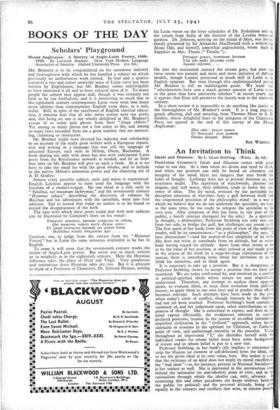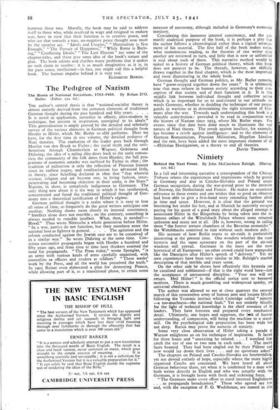An Invitation to Think
Ideals and Illusions. By L. Susan Stebbing. (Watts. 8s. 6c1.)
PROFESSOR STEBBING'S Ideals and Illusions comes with great value to our day. At a time when we desire and need to think and when our position can only be based on clearness and integrity of the mind, _there are dangers that may break the habit of thought. Lethargy does not at present threaten us, but weariness might. The repetition of watchwords, phrases and slogans, and, still worse, their inflation, tends to lower the cur- rency of ideas. The lay mind, overcast by the inevitable but deceptive emotions of war-time, feels a gulf between itself and the empowered precision of the philosophic mind: in a war in which we believe that we do not underrate the specialist, we may, at the same time, be too ready to relegate the specialist to his own area. (One symptom of this has been, in one part of the public, a barely tolerant disregard for the arts.) As a specialist in thought, a philosopher, Professor Stebbing not only sets out, from her side, to bridge the gulf, but challenges our assent to it The first merit of her book, from the point of view of the ordinary reader, will be its concreteness—" as a philosopher," she says, "I hate abstractions "—and the matter-of-fact simplicity of its style. She does not write as somebody from an altitude, but as some- body having regard for altitude. Apart from what seems to me to be the value of her position, at once arrived at and made plain in the course of the book by a stage-by-stage elimination of the untrue, there is something tonic about her invitation to us to think for ourselves, and to think again.
It is necessary to take up a position. But it is dangerous, as Professor Stebbing shows, to accept a position that we have not examined. We are today confronted by, and involved in, a conflict of political-spiritual ideals whose nature we may imperfectly understand. Therefore, any attempt to analyse these opposed ideals, to evaluate them, to trace their evolution from political history, to apply them to our own lives and to predict their effects becomes relevant. Such attempts have been made in the past, when today's crisis of conflict, though foreseen by the thinker, had not yet been reached. Professor Stebbing's book contains a summary of, and her judgement upon, other contributions to this process of thought. She is concerned to expose, and does to my mind expose effectually, the weaknesses inherent in certain declared positions, lacunae in the reason of so-called rationalists, imperfect civilisation in the " civilised " approach, either incon- sistencies or evasions in the spiritual (or Christian, or Catholic point of view, and =thorough morality in the moralist Using throughout an impersonal "I," she identifies herself with the individual reader for whom belief must have some background of reason and in whom belief is put to a new test. Professor Stebbing, as her book's title implies, is concerned to strip the illusion (or element of self-delusion) from the ideal, and to see the given ideal at its own value, bare. She makes it cleat that the existence of an ideal does not imply its moral excellence; the "bad ideal "—as, for instance, present in National Socialism- is her subject as well. She is interested in the unconscious ideal behind the rationalist (or anti-idealist) point of view, and in fig rationalism through which the idealist can, only; advance. examining this and other paradoxes she keeps midway betweeo the public (or political) and the personal attitude, being ali equally to the contacts and conflicts that arise, in sincere peopl
between these two. Morally, the book may be said to address itself to those who, while resolved to wage and resigned to endure war, have in view that their function is to creative peace, and who see that towards a true, un-negative peace thought now must be the creative act. "Ideals and Utopias," "Materialism is Not Enough," "The Pursuit of Happiness," "While Rome is Burn- ing," "Conflicting Ideals," "The Last Illusion" are some of the chapter-titles, and these give some idea of the book's nature and plan. The book admits and clarifies many problems that it makes no rash claim to resolve: it is as much imaginative as it is, in the pure sense, intellectual—in fact, one might call this a helpful book. The human impulse behind it is very real.
ELIZABETH BOWEN.



























 Previous page
Previous page